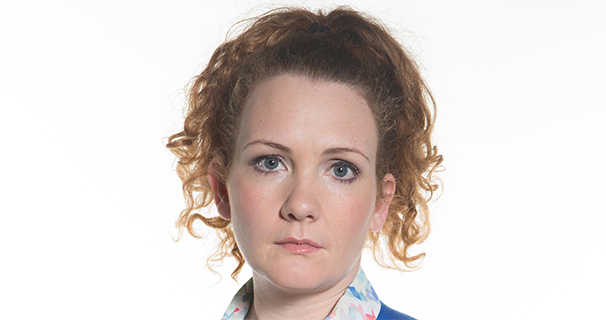Corrie's Jennie McAlpine: 'I think it's right for the storyline that Hope gets better!'

When Coronation Street bosses approached Jennie McAlpine earlier this year to explain that her next storyline would see her on-screen daughter, Hope, being diagnosed with cancer, you’d have forgiven her if she’d felt a little uncomfortable at the prospect.
Jennie – known to millions as Weatherfield favourite, Fiz Stape – was on maternity leave at the time, after giving birth to her son, Albert, last November. But she tells TV Times how filming on-screen daughter Hope’s cancer battle has been a surprisingly uplifting experience...
As part of her research, you spent time at The Royal Manchester Children’s Hospital’s Oncology and Haematology Ward. Tell us what that was like...
“You think it’s going to be scary. Obviously, it’s the most horrible circumstances that people have found themselves in, but it was such an uplifting place, and the doctors and nurses go out of their way to make it feel special. There were loads of games; people visiting all the time doing drama sessions and art sessions, and they try to make it a home from home.
“The parents were very positive – it strikes you that people just get on with things. I was really inspired seeing how they were looking after their children; it was beautiful to watch.”
Is there anyone in particular you met who you’ll never forget?
“One of the people I met was a mum whose son was born in the same hospital as Albert, three months after I gave birth, and had leukaemia. It’s awful, but I had no right to cry because he wasn’t my baby; he was this wonderful mum’s baby.
The latest updates, reviews and unmissable series to watch and more!
“She asked me about Albert, we swapped pictures of our boys, and I had my photograph taken for her baby’s memory book that she was making him for when he was better. I’ll remember meeting her and that little boy forever.”
How have the young girls who play Hope, twins Faith and Nicole Holt, got to grips with the storyline?
“The producers have had to be mindful of the fact that they’re just four years' old. We don’t want to put them into scenes that are too harrowing. That’s where we’ll never truly reflect what happens in real life, and it wouldn’t be very responsible of us to try to do that.
“So, we’re just showing a snapshot. But the girls are doing brilliantly and they know we’re just pretending.”
How do the children cope with what’s happening on set?
“We have children’s nurses as advisors. Their job in real life is to make things fun for the kids, and they’re really good at making it fun for our kids, too. We had a props teddy the other day and the nurse put a little bandage round its arm. And they have daft names for things that could be quite scary. The Hickman Line, which is the catheter the chemotherapy goes in, is called a wiggly, like a wiggly worm.”
The good news is, the writers have decided that Hope will make a full recovery...
“Yes, the doctors that I spoke to said: ‘Please show that these things can have positive outcomes, because they can!’ I think it would be a bit too much for the audience if she didn’t get better, and it’s right for this storyline.”
Do you think this will encourage viewers to consider how they can help in the fight against cancer and other life-threatening illnesses?
“I’ve just put my name down on the organ donor register – I can’t believe I hadn’t done it before – and it’s making me think about things like giving blood.”
Your son, Albert, who will be one soon, has already made his first contribution hasn’t he?
“Yes, I donated his umbilical cord to the Anthony Nolan Trust. The cord blood is rich in stem cells and can be potentially used in stem cell transplants to help people with blood cancer.
"It’s very big in America, but it’s not very common here at all – the percentage of people who are approached about it and say ‘Yes’ is still well under 50 per cent. But to me, it was a no-brainer. Albert’s stem cells are probably somewhere in a laboratory right now, being researched to help improve people’s chances of survival.”
How has it been for you tackling such a tough subject?
“I could look at this storyline and think ‘I can’t believe I’ve got to leave my beautiful baby to come and be upset that my pretend baby is ill’. Or, I could think ‘My God, I’m going home to a really healthy baby; how lucky am I?’
“I feel privileged that Corrie chose me and Alan to do this, and now that I’m getting such positive messages from people, thanking us, I feel really pleased.”

